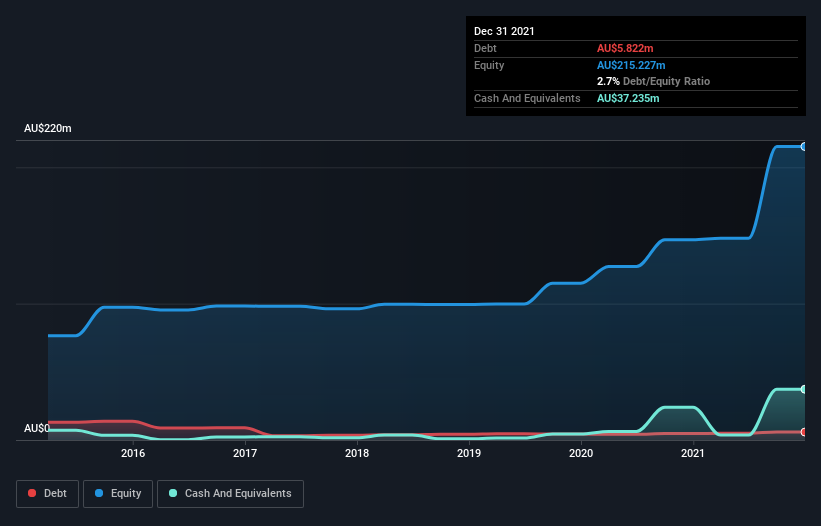
The external fund manager backed by Berkshire Hathaway's Charlie Munger, Li Lu, makes no bones about it when he says 'The biggest investment risk is not the volatility of prices, but whether you will suffer a permanent loss of capital.' So it seems the smart money knows that debt - which is usually involved in bankruptcies - is a very important factor, when you assess how risky a company is. As with many other companies Hot Chili Limited (ASX:HCH) makes use of debt. But should shareholders be worried about its use of debt?
When Is Debt Dangerous?
Generally speaking, debt only becomes a real problem when a company can't easily pay it off, either by raising capital or with its own cash flow. Ultimately, if the company can't fulfill its legal obligations to repay debt, shareholders could walk away with nothing. However, a more common (but still painful) scenario is that it has to raise new equity capital at a low price, thus permanently diluting shareholders. Of course, the upside of debt is that it often represents cheap capital, especially when it replaces dilution in a company with the ability to reinvest at high rates of return. When we examine debt levels, we first consider both cash and debt levels, together.
View our latest analysis for Hot Chili
What Is Hot Chili's Debt?
As you can see below, at the end of December 2021, Hot Chili had AU$5.82m of debt, up from AU$4.69m a year ago. Click the image for more detail. But on the other hand it also has AU$37.2m in cash, leading to a AU$31.4m net cash position.

How Healthy Is Hot Chili's Balance Sheet?
Zooming in on the latest balance sheet data, we can see that Hot Chili had liabilities of AU$15.5m due within 12 months and no liabilities due beyond that. Offsetting these obligations, it had cash of AU$37.2m as well as receivables valued at AU$14.8k due within 12 months. So it actually has AU$21.7m more liquid assets than total liabilities.
This short term liquidity is a sign that Hot Chili could probably pay off its debt with ease, as its balance sheet is far from stretched. Succinctly put, Hot Chili boasts net cash, so it's fair to say it does not have a heavy debt load! There's no doubt that we learn most about debt from the balance sheet. But ultimately the future profitability of the business will decide if Hot Chili can strengthen its balance sheet over time. So if you're focused on the future you can check out this free report showing analyst profit forecasts.
Given its lack of meaningful operating revenue, investors are probably hoping that Hot Chili finds some valuable resources, before it runs out of money.
So How Risky Is Hot Chili?
Statistically speaking companies that lose money are riskier than those that make money. And the fact is that over the last twelve months Hot Chili lost money at the earnings before interest and tax (EBIT) line. Indeed, in that time it burnt through AU$38m of cash and made a loss of AU$6.6m. With only AU$31.4m on the balance sheet, it would appear that its going to need to raise capital again soon. Even though its balance sheet seems sufficiently liquid, debt always makes us a little nervous if a company doesn't produce free cash flow regularly. When analysing debt levels, the balance sheet is the obvious place to start. But ultimately, every company can contain risks that exist outside of the balance sheet. Case in point: We've spotted 5 warning signs for Hot Chili you should be aware of, and 3 of them are concerning.
When all is said and done, sometimes its easier to focus on companies that don't even need debt. Readers can access a list of growth stocks with zero net debt 100% free, right now.
If you're looking to trade Hot Chili, open an account with the lowest-cost platform trusted by professionals, Interactive Brokers.
With clients in over 200 countries and territories, and access to 160 markets, IBKR lets you trade stocks, options, futures, forex, bonds and funds from a single integrated account.
Enjoy no hidden fees, no account minimums, and FX conversion rates as low as 0.03%, far better than what most brokers offer.
Sponsored ContentValuation is complex, but we're here to simplify it.
Discover if Hot Chili might be undervalued or overvalued with our detailed analysis, featuring fair value estimates, potential risks, dividends, insider trades, and its financial condition.
Access Free AnalysisHave feedback on this article? Concerned about the content? Get in touch with us directly. Alternatively, email editorial-team (at) simplywallst.com.
This article by Simply Wall St is general in nature. We provide commentary based on historical data and analyst forecasts only using an unbiased methodology and our articles are not intended to be financial advice. It does not constitute a recommendation to buy or sell any stock, and does not take account of your objectives, or your financial situation. We aim to bring you long-term focused analysis driven by fundamental data. Note that our analysis may not factor in the latest price-sensitive company announcements or qualitative material. Simply Wall St has no position in any stocks mentioned.
About ASX:HCH
Moderate and good value.

